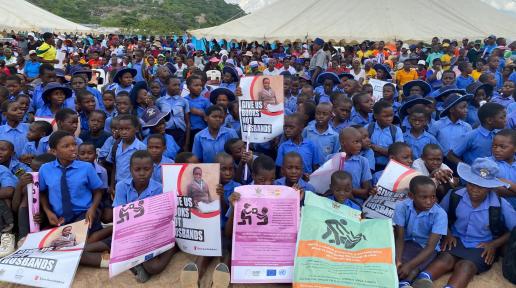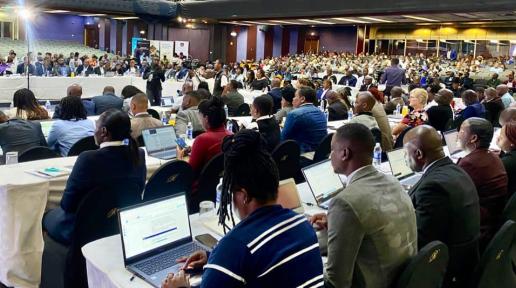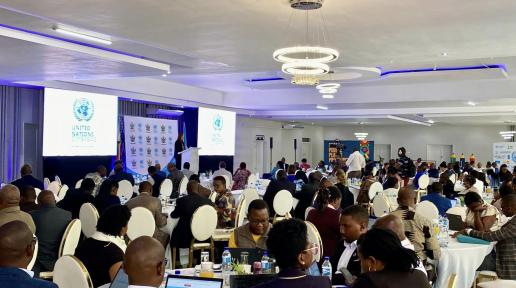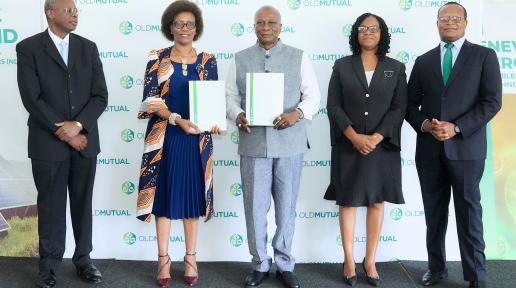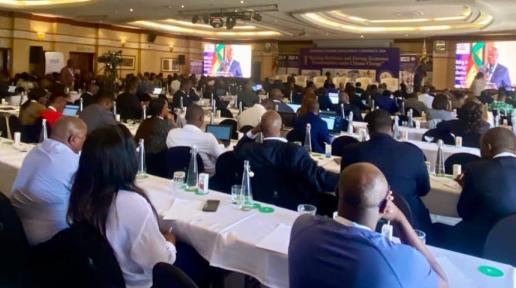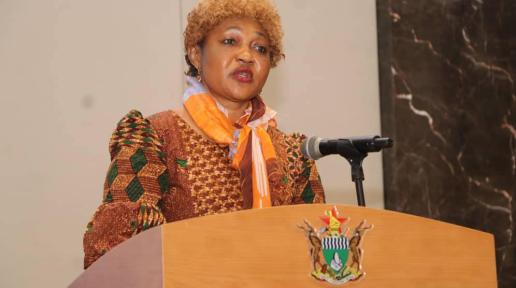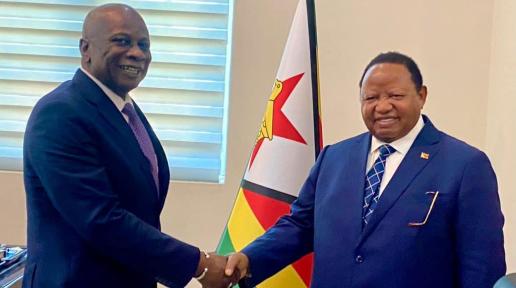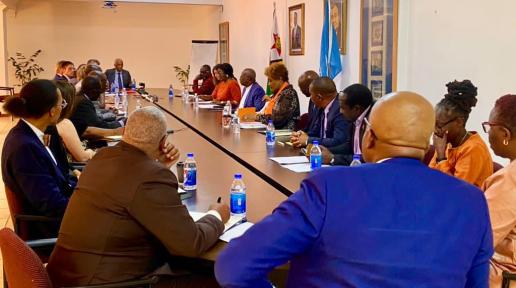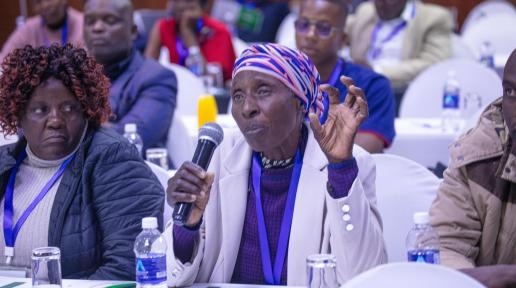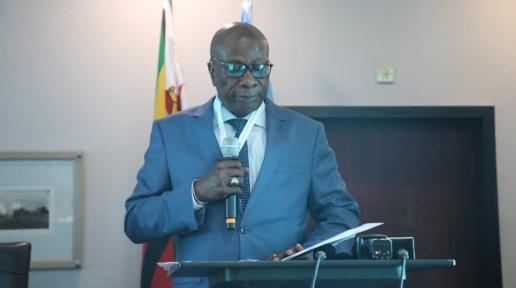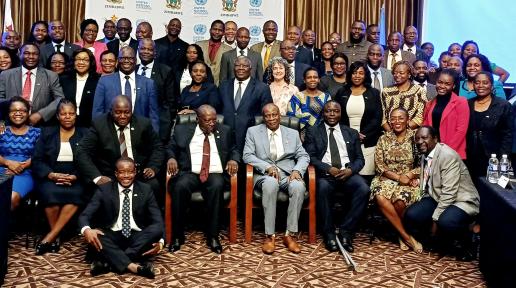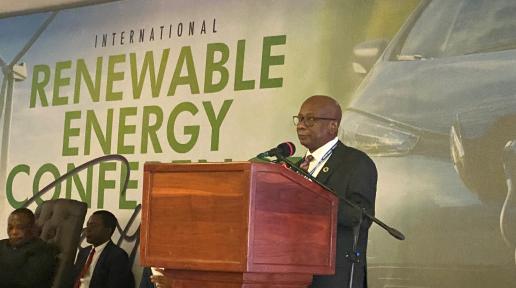Story
31 October 2025
Zimbabwe Marks UN80 with Calls for Reform, Climate Finance and Stronger Partnerships
More than 250 diplomats, development partners, civil-society leaders and young changemakers gathered to mark 80 years of the United Nations under the theme “Better Together: 80 Years and More for Peace, Development and Human Rights.”The event blended appeals for renewed multilateralism, international cooperation and justice with calls for inclusion and stronger partnerships, closing on a celebratory note as Feli Nandi and her band turned reflection into a vibrant tribute to eight decades of service to people and the planet.In a keynote that doubled as tribute and blueprint, Honourable Professor Dr. Amnon Murwira, Minister of Foreign Affairs and International Trade, said Zimbabwe’s foreign policy is rooted in its Constitution and a people-centred “Doctrine of Foreign Relations and International Trade,” encapsulated by the maxim “A Friend to All and Enemy to None.” He argued diplomacy should be judged by its tangible benefits to citizens.Using the UN’s eight-decade history, Honourable Murwira pressed for a UN “match fit” for climate shocks, digital disruption and proliferating conflicts; a reformed, inclusive international financial architecture to close the SDG financing gap; and Security Council reform that gives Africa rightful representation. He urged operationalizing the Pact for the Future through finance, technology transfer and predictable partnerships, reiterated Zimbabwe’s support for the Paris Agreement and the principle of Common But Differentiated Responsibilities, and called on developed countries to honor climate finance pledges and support concessional finance and de‑risking instruments.The Minister set a development agenda tied to national priorities, including trade and investment, technology transfer, climate‑smart agriculture, renewable energy, water infrastructure, social protection, and empowerment of women, youth and persons with disabilities — framing these as the practical outcomes diplomacy must deliver.In a video message on UN Day, UN Secretary‑General António Guterres said “We the peoples” is a living promise of the UN Charter and urged unified action, saying now is no time for timidity in addressing crises no nation can solve alone. UN Resident and Humanitarian Coordinator Edward Kallon highlighted UN achievements from smallpox eradication to peacekeeping and humanitarian reach, while warning that shrinking resources threaten services. He noted humanitarian appeals and assessed contributions are falling short, putting clinics, rations, education and protection for the most vulnerable at risk.Mr. Kallon showcased Zimbabwe as a model of UN partnership with 25 UN entities delivering more than half their programmes through joint programmes and joint initiatives, over USD 1.5 billion in combined contributions across four years, blended financing that helped unlock a US$100 million renewable energy fund, and a new cooperation framework (2027–2030) aligned with Zimbabwe’s Second National Development Strategy. He framed UN80 and the renewal agenda as a push for efficiency and joined‑up delivery, stressing that reform needs predictable political will and timely financing from Member States.Ambassador Per Lindgärde of Sweden described his country a staunch defender of multilateralism and human rights, invoking Sweden’s diplomatic heritage from Dag Hammarskjöld to current commitments on gender equality and the UN system. Warning that UN Charter principles — sovereign equality, peaceful dispute resolution, and the prohibition of force — are under strain, he urged states to uphold them.His Excellency Lindgärde advocated for a stronger, fairer Security Council with both new permanent and non‑permanent seats, including for African representation. He stressed defending international law and the Charter as pragmatic necessity for global security. On current crises, he urged robust support for Ukraine’s sovereignty, guaranteed humanitarian access in Gaza, and greater international focus on emergencies such as Sudan.He cited Sweden’s long‑term financial commitment in Zimbabwe — an average annual contribution around SEK 300 million (roughly USD 32 million) — as an example of bilateral support that strengthens UN efforts on the ground. Sweden’s work in Zimbabwe focuses on protecting democracy, human rights, gender equality and the rule of law; promoting inclusive economic development; and building environmental resilience to climate change, while seeking stronger links between development cooperation, the private sector and trade.Youth and disability inclusion brought personal urgency to the discussions. Ms. Pauline Mapfumo, a UNICEF UN Volunteer with the UNited 4 Youth Inclusion Programme, said young people must be partners in policy design, not passive recipients, and highlighted youth placements in UN agencies as turning energy into contributions in nutrition, community engagement and programme design. She called for mentorship and institutional spaces to scale youth engagement.Mr. Lordwin Rimire, speaking for young people with disabilities, acknowledged UN technical support and progress but stressed data underreporting, youth unemployment is estimated at about 37 percent, and people with disabilities face compounded barriers in education, transport and work. He demanded better disaggregated data, meaningful participation (“nothing about us without us”), accessibility built into infrastructure and services, and pathways to decent work via inclusive training and private sector engagement, arguing inclusion is dignity, efficiency and national development.Speakers repeatedly linked solidarity, national ownership, regional and global cooperation. The Government of Zimbabwe reaffirmed solidarity with peoples seeking self‑determination, including Palestine and Western Sahara, and opposed unilateral coercive measures Honourable Murwira reiterated Zimbabwe’s peacekeeping pedigree and announced the country’s candidature for a non‑permanent Security Council seat for 2027–2028, pledging to bring regional perspectives on conflict prevention, human security and inclusive recovery.Regional integration, South‑South and triangular cooperation, and scaling finance for development — including catalytic blended finance — featured across remarks. Mr. Kallon and Honourable Professor Dr. Murwira emphasized strong partnerships that create jobs, strengthen value chains and build resilience to climate shocks through green skills, energy access and water infrastructure.Mr. Kallon outlined timelines and institutional arrangements for the next Zimbabwe UN Sustainable Development Cooperation Framework (2027–2030): an eleven‑month participatory process, alignment with NDS II, a strengthened Joint Steering Committee co‑chaired by the Chief Secretary and the UN Resident Coordinator, and deliverables timed to early and mid‑2026 milestones. The framework aims to integrate national priorities with UN‑wide reforms like the Pact for the Future and UN2.0, prioritizing anticipatory action, crisis modifiers and financing that shifts from aid toward trade and investment.When formalities ended, Feli Nandi’s performance lifted the mood with diplomats, UN staff, civil society and young leaders filled the floor as the singer and her band performed a mix of soulful ballads and buoyant Afropop. The set underscored that multilateralism is lived in culture and community as much as in treaties and budgets, offering a visceral expression of the “Better Together” spirit.Harare’s UN80 commemoration combined praise for the Charter’s achievements with urgent calls to reform global financial institutions and the Security Council; expand and deliver climate finance and technology transfer; invest in inclusive digital governance; and ensure rights for women, youth and persons with disabilities backed by data, budgets and jobs.Speakers stressed that Zimbabwe views the UN as partner and instrument to realize Vision 2030 to become an upper‑middle‑income society and achieve the SDGs, requiring diplomacy to mobilize investment, market access and technology so policy delivers prosperity. UN leaders said the system’s survival depends on Member States funding it predictably and embracing reforms for efficiency and local empowerment. Young voices demanded that “Better Together” translate into real power and pathways, not tokenism.As delegates departed, the message was that the UN’s 80 years are a legacy of shared action and that the next chapters will be written by how well Member States, institutions and citizens translate rhetoric into stronger partnerships that protect dignity and expand opportunity — and by how culture and community keep those promises tied to everyday life.In Harare, that promise was renewed through policy pledges in the Government’s keynote, Sweden’s Ambassador remarks as special guest, UN speeches highlighting programmatic timelines in the UN Cooperation Framework roadmap, and the joyous rhythm of Feli Nandi’s music — for one day “Better Together” felt like a practical, celebratory commitment to keep working — and dancing — toward a fairer, more inclusive future.


